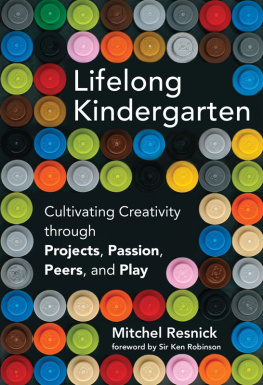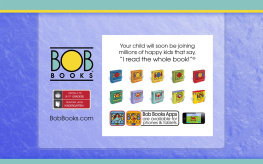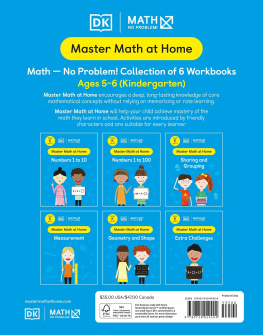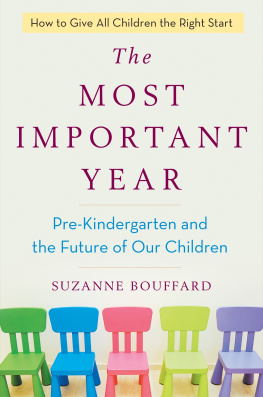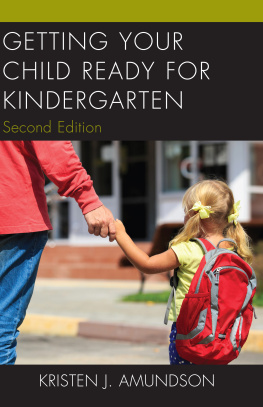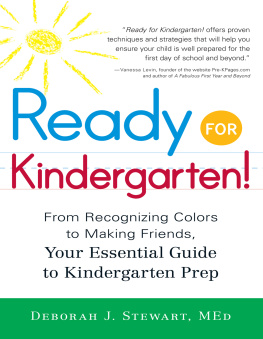
Lifelong Kindergarten
Cultivating Creativity through Projects, Passion, Peers, and Play
Mitchel Resnick
With a foreword by Sir Ken Robinson
The MIT Press
Cambridge, Massachusetts
London, England
2017 Mitchel Resnick
All rights reserved. No part of this book may be reproduced in any form by any electronic or mechanical means (including photocopying, recording, or information storage and retrieval) without permission in writing from the publisher.
This book was set in ScalaSansPro and Scala by Toppan Best-set Premedia Limited. Printed and bound in the United States of America.
Library of Congress Cataloging-in-Publication Data is available.
ISBN: 978-0-262-03729-7
eISBN 9780262344333
ePub Version 1.0
Photo credits:
Chapter 1: MIT Media Lab
Chapter 2: MIT Media Lab
Chapter 3: Sci-Bono Clubhouse
Chapter 4: Kelly Lorenz Imagery
Chapter 5: Exploratorium
Chapter 6: Exploratorium
d_r0
Foreword
Human creativity moves hand in hand with technology. Over the course of history our tools have evolved from flint knives to the Large Hadron Collider and beyond. Whether they are mechanical or digital, simple or complex, tools facilitate our creativity in two ways. Initially, they extend our bodies and enable us to do things that are otherwise difficult or impossible. With ploughs we can cultivate, with telescopes we can see, with engines we can travel, far beyond the limits of our unassisted bodies. But tools do more than extend our bodies: they expand our minds. Technology facilitates ideas that might otherwise be inconceivable.
The plough was designed to turn over soil: in due course it overturned whole ways of life and gave rise to entirely new ones. When Galileo looked through his telescope he did more than see the planets in close-up: he reconceived the earths place in the cosmos and fueled a religious revolution. In the 18th century, mechanical engines drove people faster than they could run: they also jump-started the Industrial Revolution and generated a torrent of innovations that reshaped the whole of civilization.
Mitchel Resnick has spent his professional life exploring the synergies between creativity and technology, especially for children. In Lifelong Kindergarten, he dispels common myths about creativity (that it is confined to the arts, for example), and he provides compelling examples and case studies of creative thinking in action and of its surprising outcomes. He also delves into the fascinating dynamics of creative thinking, and what he calls the Creative Learning Spiral. Through his groundbreaking work at the MIT Media Lab, he has contributed enormously to our conceptual understanding of these dynamics and of their importance for education. As youll find here, the value of his work is more than academic. He and his teams have developed programs, devices, and activities that have catalyzed the creative capacities of millions of young people around the world.
Parents and educators often worry about how much time young people spend with digital devices. As Resnick notes, its not the time spent but what theyre doing with them that matters most. Some commercial programs and devices are sophisticated consumer distractions: their designers may have put a lot of creative thought into producing them, but it takes little or no creative thought to use them. Digital technologies can also be designed to facilitate creative thinking. Resnick has long experience in working with such technologies, from his pioneering work with the Scratch programming software to his longstanding creative collaboration with the LEGO Group, which has resulted in products and activities and that are intended to cultivate creative thinking in young people, and they do.
Why does creativity matter anyway? Because being creative is part of what it means to be human. Creativity is developing original ideas that have value, and it has driven human achievement on every front since the dawn of history. The roots of human creativity lie in our unique powers of imagination, the ability to bring to mind things that are not present to our senses. Creativity is a step beyond imagination: it is putting your imagination to work. Creativity is a practical as well as a conceptual process: how and what we create has much to do with the tools and materials we have available, and what we make of and with them.
Designing toolsdigital or otherwiseis a creative enterprise in itself and like most others it evolves in the doing. It is a prime example of the Creative Learning Spiral in action. A prototype tool might work well enough but in the course of being used it may be improved in ways that werent obvious or possible to begin with. Successive versions may be turned to other uses entirely and have an impacts far beyond the original. Think of the early versions of the printing press, the motorcar, the Internet, or the smartphone.
Creativity is not only incremental: it is collaborative. However original, creative thinking almost always builds on other peoples ideas. Apple launched the iPhone in 2007. When it opened the App Store in 2008, there were 800 apps. There are now over two million, most of them neither developed nor anticipated by Apple. Illuminating the dynamics of creative thinking, and their implications for education, is another signature theme of this book.
There is a larger theme here too. Every child is born with immense natural talents. How they develop has much to do with the environment in which they are raised and the opportunities they are given. Education should be among the best of those opportunities. Too often it isnt. In many countries, formal education is mired in a dreary culture of testing and competition. That culture is now seeping down to early childhood education and risks stifling the nascent creative energies of the very young. At the heart of this book is an urgent call for education to change course.
Friedrich Froebel conceived of early education as a kindergarten because he understood, as gardeners do of plants, that children flourish best in certain conditions. The role of educators is to create those conditions. Froebel was promoting these practices in the 19th century as the Industrial Revolution was gathering force, and with it forms of mass education that were industrial in character. He had a hard struggle, and those who promote such child-centered ideas still do. These ideas are no less important for that. On the contrary, as we move deeper into the complex challenges of the 21st century, they are becoming more important.
For most of human history, the tools of creative production were in relatively few hands. The digital revolution has put sophisticated tools within reach of almost everyone. But even the most accessible of them are worthless without the ideas and expertise of those who use them. That is why this book matters. It is a grounded and visionary call for education as a whole to cultivate the ancient, creative powers that lie within us through the new tools we now have to do that. As Resnick pithily says, kindergarten is now becoming like the rest of school. In this book, he argues the opposite, that the rest of school (indeed, the rest of life) should become more like kindergarten. Im sure hes right.
Sir Ken Robinson
Los Angeles, June 2017
1 Creative Learning
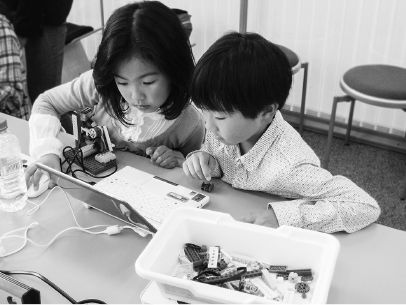
From A to X
On August 23, 2013, I met with the president of Tsinghua University, the leading engineering university in China. Because Im a professor at Massachusetts Institute of Technology (MIT) and Tsinghua is known as the
Next page
